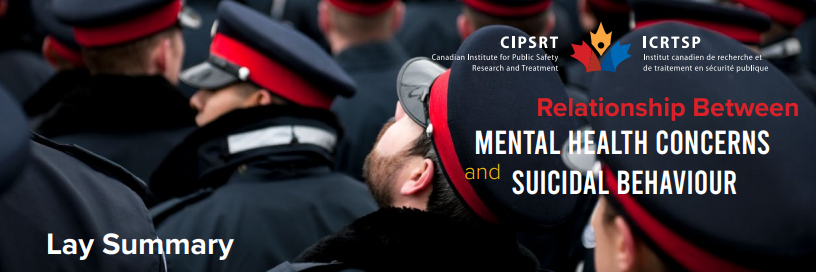Research Summaries
Why was the study done?
Police, like all public safety personnel (PSP), are exposed to stressful and potentially psychologically traumatic events as part of their jobs. Research evidence indicates a high prevalence of mental health issues and suicidal behaviours (defined as thoughts, plans, or attempts) in PSP. Understanding the relationship between positive screens for mental health conditions and suicidal behaviours in different police populations (RCMP vs. provincial/municipal police vs. civilian police workers) can help inform efforts to improve the mental health of all police.
What was done in the study?
PSP, recruited through their employers, professional organizations, or public announcements, participated in an online survey that assessed mental health symptoms, and invited open-ended feedback. The current study included participants from this larger group who identified themselves as RCMP, provincial/municipal police, or civilian police workers. Participants were asked to complete measures for symptoms of Posttraumatic Stress Disorder (PTSD), Major Depressive Disorder (MDD), Generalized Anxiety Disorder (GAD), Panic Disorder (PD), Social Anxiety Disorder (SAD) and Alcohol Use Disorder (AUD).The study included questions with “yes or no” answers that had been used in previous national mental health surveys by Statistics Canada, to assess lifetime suicidal behaviours.
What did we find out?
- RCMP participants reported significantly higher rates of suicidal thoughts than other police.
- Civilian police worker participants reported significantly higher rates of suicide attempts than RCMP or police.
- RCMP participants screened positive for PTSD, MDD, GAD, SAD and PD at higher rates than other police.
- Civilian police workers screened positive for SAD at higher rates than provincial/municipal police.
- There were no differences in reports risky drinking behaviour or suicidal planning between the three groups.
- The reports of suicidal thoughts was significantly higher for RCMP and provincial/municipal police who screened positive for any mental disorder and risky drinking. For civilian police workers, the likelihood of reporting suicidal thoughts was higher if they screened positive for PTSD.
- Provincial/municipal police were over 11 times more likely to report suicidal thoughts if they screened positive for depression.
- RCMP and provincial/municipal police participants who screened positive for MDD, PTSD, or PD were more likely to have suicidal plans. Further, the likelihood of reporting suicidal plans was higher for provincial/municipal police who screened positive for SAD.
- The likelihood of reporting a suicide attempt was higher for RCMP participants who screened positive for PTSD.
Where do we go from here?
The study results suggest that the relationship between positive screens for mental health disorders and self-reported suicidal behaviours may be different depending on the population (RCMP, provincial/municipal police, and civilian police workers.) This means that specific education programs that promote mental health awareness, resiliency, and coping, may be beneficial for supporting the mental health needs of different populations.
The original wording of the study was changed and condensed for the current lay summary.
For more information about this research contact: CIPSRT@cipsrt-icrtsp.ca
Original Study
Di Nota, P.M., Anderson, G.S., Ricciardelli, R., Carleton, R.N. & Groll, D. (2020). Mental disorders, suicidal ideation, plans, and attempts among Canadian Police. Occupational Medicine. https://doi.org/10.1093/occmed/kqaa026
Lay Summary Prepared by: Kossick, E. Edited and Reviewed by: Anderson, G.S, Martin, R. & Jones, N.
